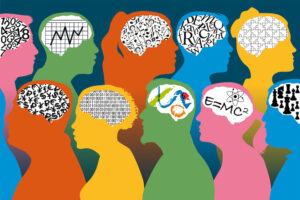[ad_1]
Does psychological well being have an effect on bodily well being and vice versa? Dr Amber Johnston – a medical psychologist specialising in neuropsychology – says it completely does
Are we lacking what’s beneath our noses?
I’m Dr Amber Johnston, a Scientific Psychologist in Neuropsychology, on a mission to assist individuals meet their brains and use them in a means that works with, moderately than in opposition to them.
To take action means braving into neuroscience to discover why we expect, really feel, study, and behave as we do- after which, how we will make individualised lasting change.
We’re flooded with well being and well-being ideas, from cutting-edge science to well being hacks and high practices for health and youth. But regardless of that, the statistics present a bleak image for the state of most of the people’s psychological and bodily well being.
Regardless of considerable, generally conflicting recommendation, how will we use this data to really improve our emotional and bodily well-being? What are the boundaries that appear to forestall us from doing all of the issues we all know we must always?
Let’s start with evaluate of the basic misunderstanding that also permeates each most of the people and the medical group alike – that of the separation of thoughts and physique.
READ MORE: Mind meals: 7 key vitamins for a more healthy mind

Thoughts vs Physique
In my clinic, I see individual after individual coming to me for varied difficulties round stress, low temper, anxiousness, or only a common unease with none label to go together with it.
Most need to really feel higher and prioritise wholesome existence however really feel thwarted by failed change makes an attempt. Many of those shoppers endure with well being signs like diabetes, cardiovascular irregularities, persistent ache, insomnia, auto-immune issues, and fatigue.
Or much more generally, they converse of medically unexplained (undiagnosed) points – common sleep issues, abdomen upset, headache, sore neck, fogginess, urge for food modifications, lethargy, and chest or respiration points.
I discover and enquire about these well being circumstances, however the consumer is commonly shocked; in spite of everything, they’re in my workplace to sort out their feelings. They view their bodily state as simply irrelevant small speak.
That is the place medical reductionism, separating psychological and bodily, will be seen at its pinnacle; most paradoxically, inside the healthcare system designed to greatest perceive our brains and our bodies!
The thoughts/physique dualism is the time period used to explain the separation our tradition has created between the workings of the thoughts and the processes of the physique, which reduces every to a separate pathway that should be explored and handled in isolation.
Freud and William James used medical instances to indicate the influence of emotion state and the unconscious thoughts on bodily sickness
Tradition has altered this view over time, maybe in an unhelpful route. The nice minds of Aristotle and Hippocrates had been pioneers for the roles of the soul, thoughts, and humours on the bodily physique.
Rene Descartes separated the psychological from the bodily together with his thoughts/physique dualism within the seventeenth century, doubtless in response to the church deeming sickness as an indication of God punishing one’s naughty soul. However later, nice thinkers comparable to Freud and William James used medical instances to indicate the influence of emotion state and the unconscious thoughts on bodily sickness.
As we moved into the twentieth century although, with the invention of penicillin and germ concept, the 2 separated once more. The led to an increase of the biomedical mannequin specializing in micro organism, virus, musculoskeletal circumstances, and medication or surgical procedures for therapy.
If no such situation will be recognized, the ailment can solely be defined by a woolly, less-understood space of summary psychological state or psychological sickness, historically much less revered and traditionally, not all the time handled humanely (consider the horror tales of outdated psychiatric amenities).
The dismissal of psychogenic explanations (which means growing from psychological or social processes), left a sure concern in many individuals that they too might need signs that forged them other than entry to the extra revered biomedical healthcare professionals.

Psychological well being DOES have an effect on your bodily well being
To today, when my shoppers enter my workplace, the battle continues to be palatable. I see some sufferers hellbent to elucidate that their ache is ‘actual’ and their fatigue and cardiovascular state is a ‘recognized’ situation… so there’s positively nothing that a bit of psychology therapy can do about that.
I sympathise with the concern of rejection by medical docs, going through unclear signs alone, with shoppers reporting experiences of implied blame that an individual ‘ought to really feel higher by now’ or the therapy ‘ought to have made a distinction if adopted correctly.’
All of the issues in your head have ‘actual’ and dramatic influences throughout our physique system
Others have felt misunderstood and deserted when a marketing consultant says, ‘excellent news, there’s nothing fallacious with you!’ (when clearly there’s) and even the dreaded, ‘it’s most likely simply stress, in your head.’
Sure, in fact it’s. All of the issues in your head have ‘actual’ and dramatic influences throughout our physique system. Our ideas and feelings do influence our physiology and might create sickness over time; and in return, the indicators from our physique are utilized by our mind to know our internal and outer worlds, creating feelings and ideas for us to then handle.
It’s a outstanding determine of 8 interaction- indicators travelling from mind right down to physique and again as much as mind once more. So which means a thought can affect a heartbeat, or a digestive response, and even influence our getting old course of over time.
It’s time that all the healthcare discipline catches as much as rewrite this antiquated medical narrative that sees physique elements in isolation moderately than holistically.
READ MORE: 10 methods to enhance psychological well being at work

The wonderful mind
The mind is the orchestrator of every part that we understand and all of the processes that our physique must survive and thrive. And subsequently, to make sure we improve its functioning, it’s paramount to know how our thought content material, emotion state, behaviour react to the interior and exterior world from our senses and have direct influence on our bodily well being. They can’t be separated.
However the nice information is that we will harness the facility of our brains to reinforce total wellbeing. On this upcoming collection, I intend to deep dive into a few of the particulars of how our brains detect menace, study, and make errors.
The mind is the orchestrator of every part
Understanding these processes will lead you to raised perceive the place our stress originates and will get strengthened, regardless of our greatest efforts to minimise it. There are expertise to study with managing these processes, and they don’t seem to be fast hacks, however the rewards really feel nice after they create lasting change.
Include me to get to know the you that maybe you’ve been lacking, the mind behind your individual nostril….
Keep tuned for the subsequent article on this collection – ‘Is stress our pal?’, subsequent Thursday the place I talk about why some stress responses are important.
Dr Amber Johnston is a medical psychologist specialising in neuropsychology (healthymindpsychology.co.uk)
Like this text? Signal as much as our publication to get extra articles like this delivered straight to your inbox.
[ad_2]




